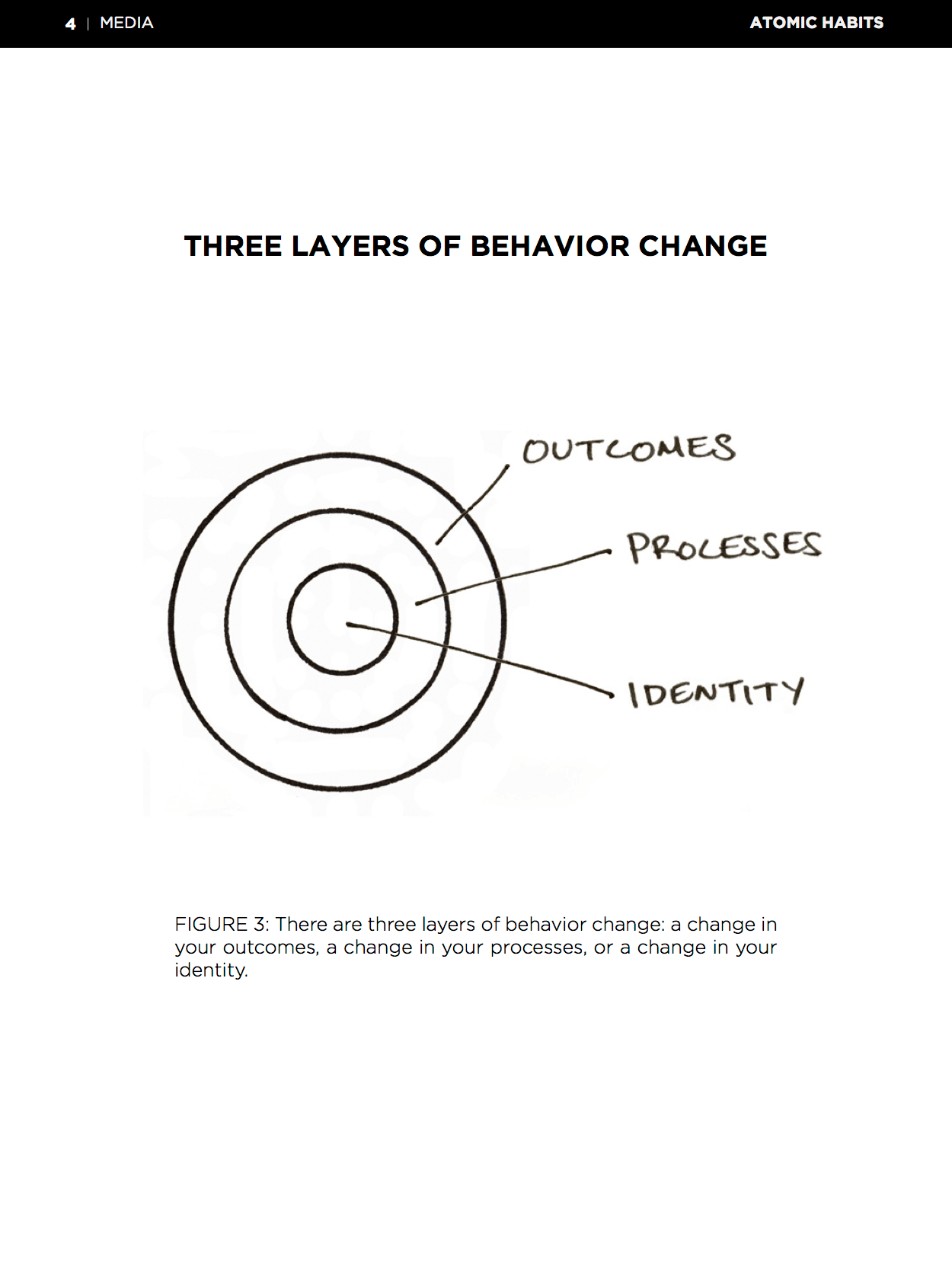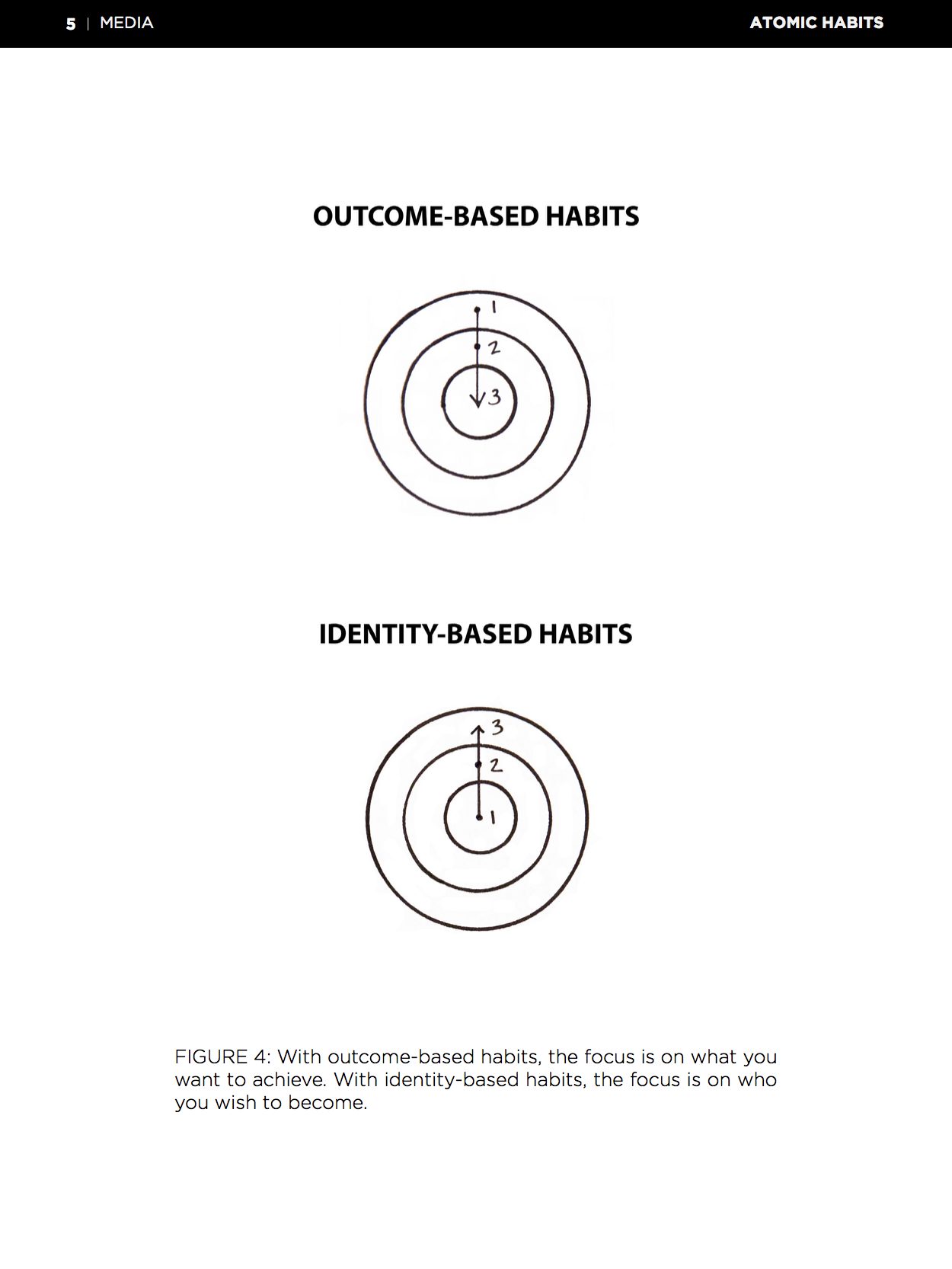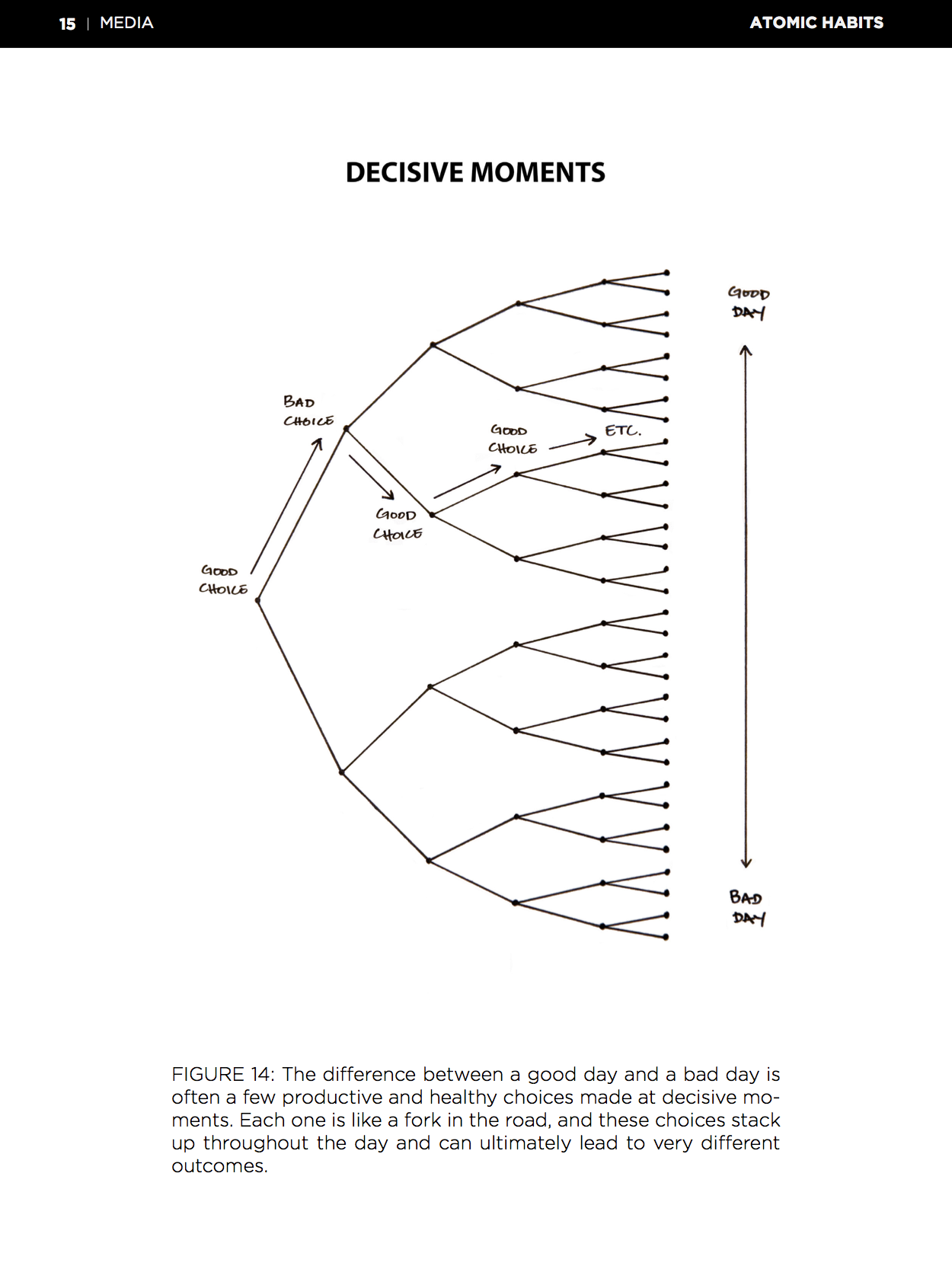Book Notes: Atomic Habits
To be honest, I am not sure how I originally came across James Clear's work. I must have signed up for his newletter a while ago after reading an article he published on his website. I have to admit, I mostly ignore his emails and threw them in the trash.
He had an incredible marketing campaign coincide with the release of his new book Atomic Habits because I bought it after getting multiple emails from him, seeing him retweet people talking about it on Twitter, and watching an interview he did about it with a morning talk show.
I actually pre-ordered the book by a few days on Amazon and it came a few days later.
The book seems to be pretty popular (I saw Adam Neary from Airbnb tweet about it the other day. And with good reason! It is highly engaging, easy to read, and excellent at describing why little changes in our behavior can have big impacts on our life and actionable steps to get started with them.
Notes
Chapter 1 - The Surprising Power of Atomic Habits
- To change habits requires small changes and improvements that eventually hit critical mass
- Atomic Habits are little habits that are a part of a larger system
- "You don't rise to the level of your goals, you fall to the level of your systems"
Chapter 2 - How Your Habits Shape Your Identity (and Vice Versa)
Changing habits is hard because
- We try to change the wrong thing
- We try to change habits in the wrong way
Three Layers of Behavior Change


Example: 2 people offered a cigarette (Oh, what a relatable problem for me! ~KM)
- "No thank you, I'm trying to quit"
- "No thank you, I'm not a smoker"
- Old identity can sabotage one's new plans for change (Ironically, I was in the cigarette situation described above last weekend with some old college friends and my response was not as I intended because of my past identity. ~KM)
- Making something a part of your identity makes it easy to perform the actions/behaviors necessary in order to reach a goal
- Becoming the best version of yourself requires you to continuously edit your beliefs and to upgrade and expand your identity
- Identity is derived from Latin word "essentitas" which means being, and "identidem" which means repeatedly. Your identity literally means "repeated being"
- We change bit by bit, day by day
- Every action you take is a vote for the type of person you wish to become (this reminds me of how every dollar you spend is a vote for what you wish to exist ~KM). This is why meaningful change does not require radical change. Small habits can make a meaningful difference by providing evidence of a new identity. And if change is meaningful, it actually is big.
- Doesn't have to be 100% "good votes", you can vote for some bad habits sometimes, so long as you get a majority in the direction you want to go.
This chapter ends in a very "pump up" sort of way. Foreshadows future conversation about feedback loops.
Chapter 3 - How to Build Better Habits in 3 Simple Steps
Your habits are just a series of automatic solutions that solve the problems and stresses you face regularly.
The 1st Law of Behavior Change - Make It Obvious
Chapter 4 - The Main Who Didn't Look Right
We do a lot of things without noticing them. Step 1 of changing habits is noticing the habits we already have.
- Create a "Habits Scorecard" and notice what you do throughout the day. Call them out and bring attention to them.
Chapter 5 - The Best Way to Start a New Habit
-
Implementation intention (planning a specific time/place when you will do something) is crucial to actually doing something.
-
When Situation X arises, I will perform Response Y.
-
If you aren't sure when to start a habit, try the first day of the week, month, or year. People are more likely to take action at those itmes because hope is usually higher.
Diderot Effect: obtaining a new posession often creates a spiral of consumption that leads to additional purchases. One action becomes trigger for next action.
Habit Stacking: special form of implementation intention.
"After CURRENT_HABIT, I will NEW HABIT."
-
It's crucial to select the right cue for the habit you want to develop. If you want to develop a daily habit, then your cue must happen daily. And at appropriate time and place!
-
One way to find the right trigger for habit stacking is brainstorming a list of current habits (use your habit scorecard!).
- In one column, write down habits you do without fail
- In another column, write down things that happen to you without fail
Chapter 6 - Motivation is Overrated; Environment Often Matters More
Environment is the invisible hand that shapes human behavior
B = f(P,E)
The most powerful of human sensory abilities is vision => this allows you to be the architect of your environment
Behavior is not defined by objects in environment, but our relationship to them.
Because environment plays a huge role, it's easier to start new habits in a new environment.
Every habit should have a home.
Chapter 7 - The Secret to Self Control
"Disciplined" people are better at structuring their lives in a way that does not require heroic will power and self control. In other words, they spend less time in tempting situations.
For bad habits, instead of making it obvious, make it invisible
2nd Law of Behavior Change: Make It Attractive
Chapter 8 - How to Make a Habit Irresistible
Our world is filled with engineered reality that makes things more attractive - engineered food, porn, advertisements. => Drives excess consumption from us
All habits share a dopamine spike
- In experiments, if dopamine blocked, pleasure can still be experienced but desire cannot.
No Desire == No Action- Dopeamine isn't just pleasure => it plays a central role in neurological process including motivation, learning and memory, punishment and aversion, and voluntary movement.
- Released not only when we experience pleasure, but when we anticipate it
It is the anticipation of a reward that makes us take action, not the fufillment
Much more of the brain (space-wise) is responsible for cravings and desire.
- Desire is the engine that drives behavior.
- We need to make our havits attractive because it is the expectations of a reward experience that motivates us to act in the first place.
Temptation Building: You are more likely to find a behavior attractive if you get to do one of your favorite things at the same time.
Premack's Principle: More probable behaviors will reinforce less probible behaviors.
Habit Stacking + Temptation Building Formula
- After
CURRENT_HABIT, I willHABIT_I_NEED(Makes doing what you need more attractive) - After
HABIT_I_NEED, I willHABIT_I_WANT
Chapter 9 - The Role of Family and Friends in Shaping Your Habits
One of the deepest human desires is to belong. Humans adapt their behavior to be inline with the group.
We immitate the habits of three particular groups:
- The Close
- The Many
- The Powerful
One of the most effective things you can do to build better habits is join a culture where your desired behavior is the normal behavior. Pro Tip: Helps if you have something else in common too. The shared identity begins to reinforce your personal identity.
Whenever we don't know how to act, we look to the group to guide our behavior. The normal behavior of the tribe often overpowers the desired behavior of the individual. (That explains why people act in ways that aren't in accordance with themselves when in a group, think Nazi Germany. ~KM)
Humans pursue power, prestige, and status. We are drawn to behaviors that earn us respect, approval, admiration, and status. Once we fit in, we start to look for ways to stand out.
Chapter 10 - How to Find and Fix the Causes of Your Bad Habits
Cravings come from a deeper underlying motive. When you smoke a cigarette, you don't actually want to smoke, you want to relief stress or fit in.
There are many different ways to address the same underlying motive
Stressed?
- Smoke a cigarette
- Go for a run
- Predictions precede actions. Predictions lead to feelings, which is how we describe cravings - feelings, urges.
The gap between your current state and desired state provides reason to act.
Desire = Where you are now - where you want to be
Hard habits are more attractive when associated with positive experience.
Instead of "having" to do something, you "get to do something => Shifts tasks from a burden to an opprotunity. Reframe association.
3rd Law of Behavior Change: Make It Easy
Chapter 11 - Walk Slowly, but Never Backward
Motion vs Action
- Motion: Planning, strategizing, learning.
- Makes us feel like we're making progress without the risk of failure.
- Most stay in motion and don't take action in order to delay failure.
- Action: Behavior that will deliver an outcome
Get in your reps!
Habit Formation: Process by which behavior becomes progressively more automatic through repitition.
- More repeat => more structure of brain changes (long term potentiation)
- "Neurons that fire together, wire together"
- Repetition is a form of change.
- Each time you repeat an action, you activate a particular neural circuit associated with that habit.
- Habits form based on frequency, not time.
Chapter 12 - The Law of Least Effort
Law of Least Effort: When deciding between two options, people will naturally gravitate towards the option that requires the least amount of work.
Habits are obsticles to get what you want
- Dieting = Getting Fit
- Meditation = Feeling Calm
- Journaling = Thinking Clearly
We want the outcome that the habit delivers. This is why making habits easy is crucial! You are more likely to follow through if habit is easy.
Reduce friction of habits
- Easiest Way: Environment Design
- Reduce friction associated with good habits, increase friction associated with bad habits
Chapter 13 - How to Stop Procrastinating by Using the Two-Minute Rule
Habits are automatic choices that influence the concious decisions that follow. A habit can take a few seconds but can shape the actions that you take minutes or hours afterwards! Similar to an entrance ramp to a highway. (Great analogy ~KM)
Decisive Moments: Choices that deliver an outsized impact. The start of bigger choices. (Think changing clothes before going to workout or going to a particular restauraunt)

Two Minute Rule: When you start a new habit, it should take less than two minutes to do.
- Habits should not feel like a challenge. The actions that follow can be challenging but the first two minutes should be easy.
- Master the habit of showing up. Habits must be established before they can be improved.
Habit Shaping: Start with first two minutes then build up to intermediate steps.
Chapter 14 - How to Make Good Habits Inevitable and Bad Habits Impossible
Make It Difficult (to perform bad habits)
- Commitment Device (Ulysses Pact): Choice you make in the present that controls your actions in the future.
- Automate as much as you can
4th Law of Behavior Change: Make It Satisfying
Chapter 15 - The Cardinal Rule of Behavior Change
- What is rewarded is repeated, what is punished is avoided.
First three rules increase odds behavior will be performed. Rule 4 increases odds behavior will be repeated in the future.
- Needs immediate satisfaction.
Time Inconsistency: Humans brains are programmed for immediate satisfaction, not long term gratification.
- We value the present more than the future.
He quotes Bastiat on p. 189! "It almost always happens that when the immediate consequence is favorable, the later consequences are disasterous and visce-versa.
Must feel successful in order for habit to stick.
- Ending habit must be rewarded
- Reinforcement ties habit to immediate reward, which makes it satisfying when you finish.
- The short term reward should align with the long term reward.
Eventually, the identity becomes the reward or other intrinsic things (better mood, more energy, etc).
Incentives start habit, identity maintains habit.
Chapter 16 - How to Stick with Good Habits Every Day
Habit Tracker: A way to measure progress on a habit (i.e. move paper clips from one jar to another).
- "Don't break the chain!"
Benefits:
-
Habit Tracking is obvious
- Recording habit will trigger next one.
- We also think we are better/lose track of progress
- Keeps us honest
-
Habit Tracking is attractive
- Most effective form of motivation is progress.
- When we see that we are moving forward, we continue down path.
-
Habit Tracking is satisfying
- It's satisfying to X off a todo item, see progress
When habits break down: NEVER MISS TWICE!
- The first mistake/slip up never ruins you. It's the subsoquent ones that do.
Missing Once = AccidentMissing Twice = New Habit
Chapter 17 - How an Accountability Partner Can Change Everything
Make habits immedietely satisfying
- Can't be a long delay between action and punishment
- Strength of punishment must match relative strength of behavior trying to be changed.
- The more tangible, concrete, and immediate the consequence, more likely to influence behavior.
"Laws and regulations are examples of how government can change our habits by creating social contract"
Habit Contract: Verbal or written agreement in which you state your commitment to a particular habit and the punishment that will occur if you don't follow through. Then find one or two people to keep you accountable.
Advanced Tactics: How to Go from Being Merely Good to Being Truly Great
Chapter 18 - The Truth About Talent (When Genes Matter and When They Don't)
The secret to maximizing success is to choose the right field of competition (true for habits, sports, business).
- Easier when alligned with our natural inclinations and abilities.
- Must accept people are born with different abilities
- People at top of competitive field are not only well trained, they are also well suited for the task. If you want to be great, select right place of focus is critical.
Genes don't determine destiny, they determine area of opprotunity
- Direct effort towards areas that excite you and match your natural skills.
Choose the habit that best suits you, not the most popular.
We are all different! Find habit that fits you (Rule #4 - satisfy)
Explore/Exploit Trade Off
- When good at something, exploit it.
- When bad at something, start to explore something else.
Ask yourself:
- What feels like fun to me but work for others?
- What makes me lose track of time?
- Where do I get greater returns than the average person?
- What comes naturally to me?
When you can't win by being better, you can win by being different. By combining your skills, you reduce the level of competition, which makes it easier to stand out.
Specialize - more you master a specific skill, harder for others to compete with you.
Chapter 19 - The Goldilocks Rule: How to Stay Motivated in Life and Work
How to keep motivation in the long run? Find challenge that is difficult but not too difficult. "Just manable difficulty"
Start "easy" habit but then keep increasing difficulty in small ways.
Being just the right difficulty encourages flow state.
"Greatest threat to success is not failure but boredom"
- Habits require novelty to keep folks engaged. Novelty can't last forever, eventually you get bored.
Stepping up when its annoying/painful/draining is wh at differentiates professional from amateur.
Chapter 20 - The Downside of Creating Good Habits
Habits are the foundation for mastery
- Allows you to free up mental space for more advanced details
- Downside: You get used to doing things a certain way and stop paying attention to little errors.
Mastery = Habits + Deliberate Practive
Solution to being complacent? Setup a system of reflection and review.
Annual Review in December - tally habits, articles written, workouts put in, places visited, etc.
- What went well this year?
- What didn't go well this year?
- What did I learn?
Integrity Report in June - check in, make sure on course
- What are the core values that drive my life and work?
- How am I living and working with integrity right now?
- How can I set a higher standard in the future?
Integrity and Annual reports are crucial periods of refinement. They prevent gradual slide, remind to revisit desired identity, and consider how habits are helping (or hurting) me to become person I want to be. They indicate whether habits need upgraded or dialed back and focus on fundamentals.
Most Important - Review Identity
- Holding onto certain habits can prevent growth and next level of identity from developing. Identity creates a sort of "pride" that encourages denying weak spots and prevents growth.
Solution: Avoid making single aspect of your identity a large portion of who you are.
- Paul Graham: "Keep identity small"
Choose flexible identity
- "I'm CEO" => "I'm the type of person who build and creates things"